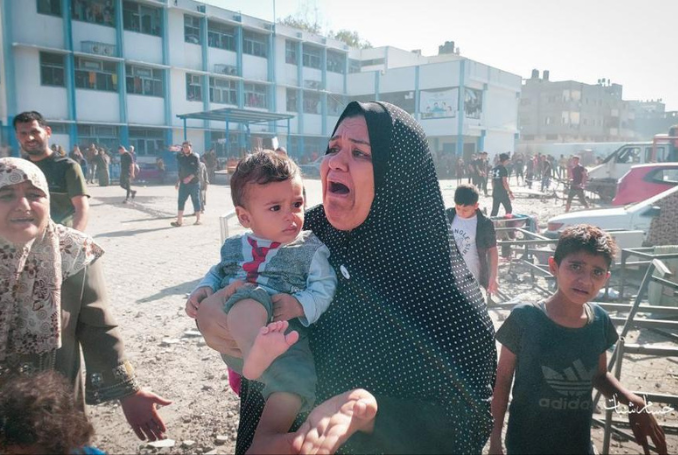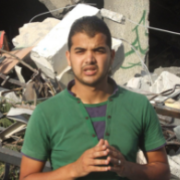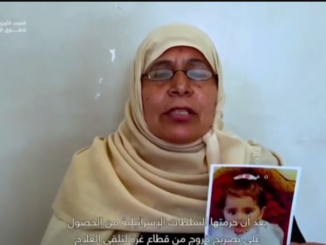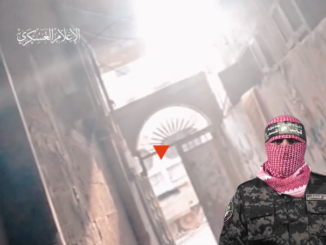
Mahmoud Tawfiq, a young man from Nuseirat refugee camp, spoke with the Palestine Chronicle and described the challenges he faced during his wife’s childbirth amid the conflict.
“Doctors described my wife’s pregnancy as high-risk, stating that she could not deliver naturally and required a cesarean section,” Tawfiq told us.
“Additionally, she needed daily heparin injections to prevent blood clots. This was a routine we adhered to for nine months. Unfortunately, fate dictated that her due date would fall in the first week of the war, leading to an indescribable ordeal,” he continued.
“It was fortunate that my home is close to the Al-Awda Hospital in the Nuseirat refugee camp in the heart of Gaza. I felt reassured before the war due to this proximity. However, with the onset of the conflict, Al-Awda Hospital was transformed into an emergency hospital, overwhelmed with injuries and martyrs, adding to the already immense strain on the medical staff.”
Reaching the Birthplace
“Three houses adjacent to mine were targeted by Israeli airstrikes during the early days of the war. The bombardment resulted in the complete destruction of the targeted homes, causing extensive damage to all the houses in the neighborhood. My home became uninhabitable due to the shattered windows and the collapse of some walls,” Tawfiq continued.
“The evacuation process during the airstrikes was exhausting for my wife, posing a significant risk to her. After staying for a while at a nearby house in the camp, we decided to go to her family’s house in Khan Yunis. Their house is close to the Al-Amal Hospital. I expected the place to be safer than Nuseirat.”
“Despite the Israeli announcement that the southern and Wadi Gaza areas would be safe, I live in the Nuseirat camp, which is south of Wadi Gaza, and it was repeatedly targeted. We went to Khan Yunis, located in the southern Gaza Strip, thinking it would be safer. However, the airstrikes persisted. Evacuation and escape became recurrent events, with the scent of death and destruction pervading every part of Gaza,” Tawfiq told us.
Miscarriages for Dozens of Women
“I had to accompany my wife to the hospital for checkups,” Tawfiq explained, adding:
“Upon entering the maternity ward, I witnessed many challenging cases. Injured women were brought in by doctors for urgent deliveries, and deceased women were subjected to post-mortem cesarean sections to save the life of their babies. The place was filled with blood, and crying echoed everywhere.”
Grateful, Tawfiq said, “Fortunately, fate favored us, and my wife’s delivery was not delayed. She underwent a cesarean section two weeks after the war began, and we left the hospital early to make room for other cases. However, God helped those whose deliveries were delayed or those who are still pregnant.”
The situation, however, is still horrific for pregnant women in Gaza. “Hundreds of pregnant women had to walk more than 14 kilometers during the displacement journey from northern Gaza and Gaza City to areas south of the valley,” Tawfiq told us.
“These women are still in shelters or tents in the open without proper healthcare. While my wife managed to give birth, I have been unable to provide my son with the vaccinations he needs. Within the next several days, he will require another vaccination. But all UNRWA clinics have been closed since the beginning of the war.”
Vaccinations for Newborns
The UN Relief and Works Agency (UNRWA) has continued operating with a weak emergency plan in all its health clinics across the Gaza Strip since the beginning of the war.
The residents of Gaza heavily rely on the agency’s clinics for medical treatment, access to medication, and vaccinations for newborns. However, the clinics are still functioning under an emergency plan, with limited treatments available.
Khalil Abu al-Rous explained to The Palestine Chronicle how his wife gave birth in the midst of the war. “Thanks to God, my wife managed to give birth safely amid the tough circumstances the region is going through, with hospitals overcrowded with thousands of martyrs, wounded, and displaced individuals.”
He added, “I struggled but managed to get my newborn son the vaccination designated for children after the first week of birth. But dozens of other newborns were unable to reach the clinics that provide these newborn vaccinations. This situation poses a serious threat to the health of these children.”
Hospitals in the Gaza Strip have been struggling with severe overcrowding, not to mention the thousands of martyrs and wounded individuals that have been treated since the beginning of the war.
Two-thirds of Gaza’s hospitals are out of service, with the remaining hospitals designated to treat the wounded and the injured.

– Abdallah Aljamal is a Gaza-based journalist. He is a contributor for The Palestine Chronicle from the Gaza Strip. His email is abdallahaljamal1987@gmail.com








Sorry, but this has been going on for decades and has intensified over the past 15 or so years. WHY THE HELL would someone have a baby in a war zone?? the other side of that is that obviously Israeli forces and the Zionists in Israel, America, Germany et al, are murdering children in Gaza, because they’re trying to prevent any opposition in the future.